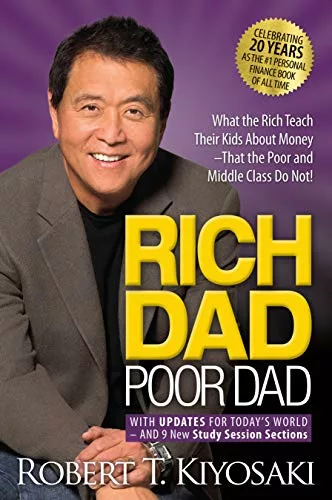Rich Dad Poor Dad
Rich Dad Poor Dad: What the Rich Teach Their Kids About Money That the Poor and Middle Class Do Not! By Robert T. Kiyosaki.

What the Rich Teach Their Kids About Money That the Poor and Middle Class Do Not
Rich Dad Poor Dad by Robert Kiyosaki is a revolutionary book that challenges traditional thinking about wealth and financial education. With its powerful message, the book aims to provide readers with valuable insights into the mindset and strategies of the rich. Kiyosaki draws upon his own life experiences and the contrasting financial advice he received from his friend’s “rich dad” and his biological “poor dad” during his upbringing. The book offers a fresh perspective on asset management and financial independence through engaging storytelling and practical lessons.
The Story of Two Dads
The book begins with Kiyosaki recalling his childhood, where he grew up with his two fathers, who held opposing views on money and financial success. His “Poor Dad” was highly educated, a well-respected government employee, and earned a decent income. However, despite his academic achievements, he struggled financially and often lived paycheck to paycheck. On the other hand, his “Rich Dad,” who had no formal education, was a self-made millionaire and a successful entrepreneur.
From his “Rich Dad,” Kiyosaki learned invaluable and sometimes harsh lessons about the importance of financial literacy and acquiring assets that generate income. Rich Dad believed in the power of financial education, teaching Kiyosaki the difference between assets and liabilities, the significance of cash flow, and the necessity of building a business or investing in real estate. He emphasized the need to develop a mindset focused on creating wealth and building a solid financial foundation.
In contrast, Kiyosaki’s “Poor Dad” had a more conventional mindset. He believed in the traditional path of getting a good education, finding a secure job, and relying on a stable paycheck to achieve financial security. However, Kiyosaki observed that this mindset often led to a cycle of financial struggles and limited opportunities for true wealth creation.
The Importance of Financial Education
In the subsequent chapters, Kiyosaki emphasises financial education’s significance and highlights financial literacy’s impact on one’s financial well-being. He argues that the traditional education system fails to adequately prepare individuals for the complexities of money management and investing. He also underscores the importance of understanding financial concepts such as cash flow, taxes, and investments. By increasing financial literacy, individuals can make informed decisions about their money and take control of their financial future.
“The single most powerful asset we all have is our mind. If it is trained well, it can create enormous wealth in what seems to be an instant”
Assets vs. Liabilities
One of the central themes in “Rich Dad Poor Dad” revolves around understanding the difference between assets and liabilities. Kiyosaki defines assets as things that generate income and increase in value, while liabilities are expenses that consume income without adding value. He encourages readers to focus on acquiring assets that generate passive income instead of accumulating liabilities disguised as assets. This also leads to one of the book’s more controversial claims, which is that the family home is not an asset.
“The rich acquire assets. The poor and middle class acquire liabilities that they think are assets.”
The Power of Mindset and Taking Action
Kiyosaki emphasizes that wealth is built not only through financial literacy but also through a strong mindset and the willingness to take calculated risks. He encourages readers to overcome their fear of failure and to embrace the mindset of an entrepreneur. One of the most inspiring quotes from the book is, “Winners are not afraid of losing. But losers are. Failure is part of the process of success. People who avoid failure also avoid success.” This quote serves as a powerful motivator to step out of one’s comfort zone and pursue opportunities for financial growth. Kiyosaki also discusses the importance of creating passive income streams and building a portfolio of investments that can sustain one’s lifestyle. He shares strategies such as real estate investing, starting a business, and investing in stocks.
Why It’s Worth Reading
Rich Dad Poor Dad: What the Rich Teach Their Kids About Money That the Poor and Middle Class Do Not is a compelling and eye-opening book that challenges conventional wisdom about money and wealth. Kiyosaki’s personal anecdotes and practical financial advice make for an engaging read. While some critics argue that the book oversimplifies complex financial concepts, it undeniably serves as a catalyst for questioning our beliefs about money and encourages readers to seek financial education and take control of their financial future. Whether you agree with all the ideas presented or not, “Rich Dad Poor Dad” is a thought-provoking book that is well worth reading.

